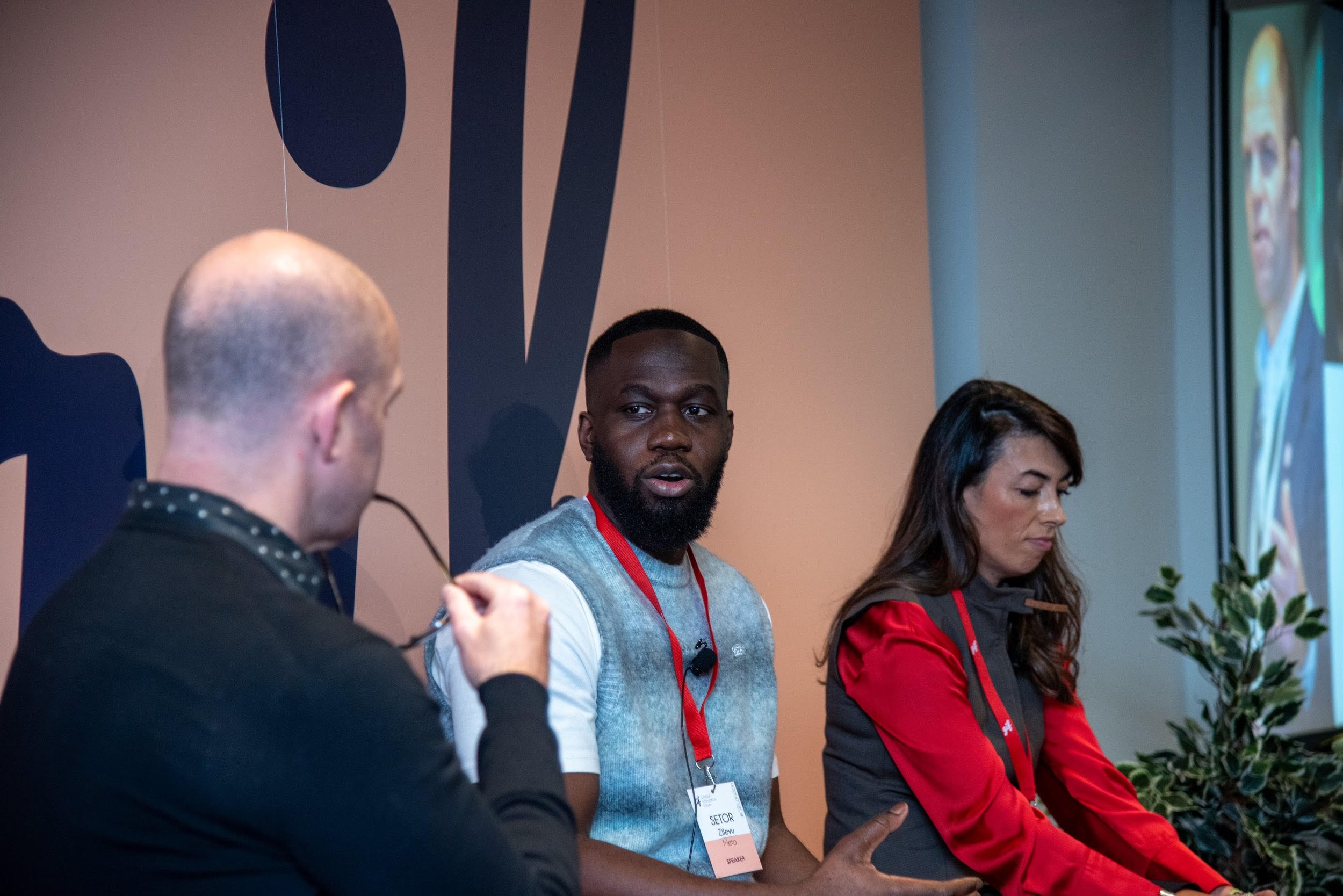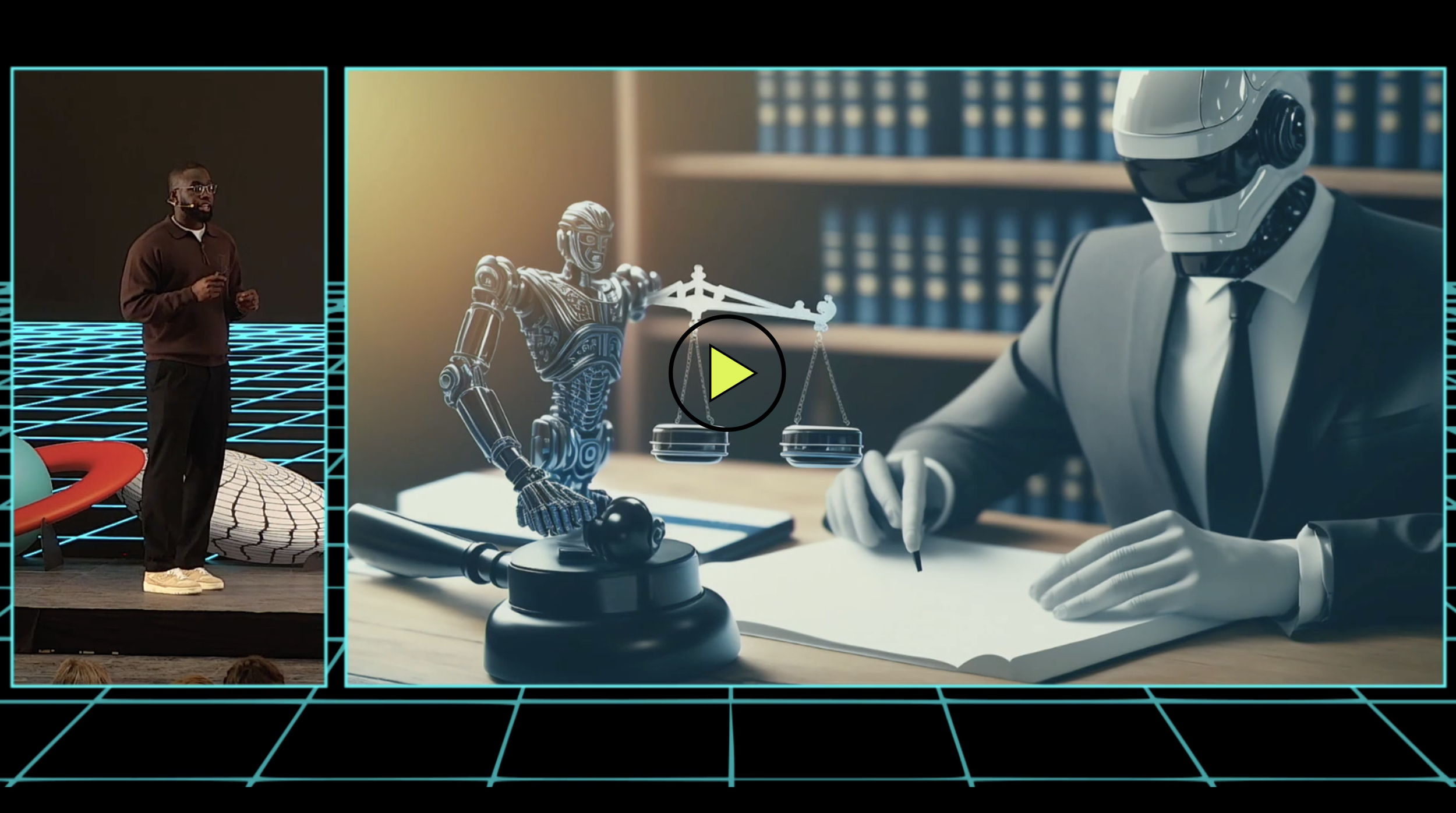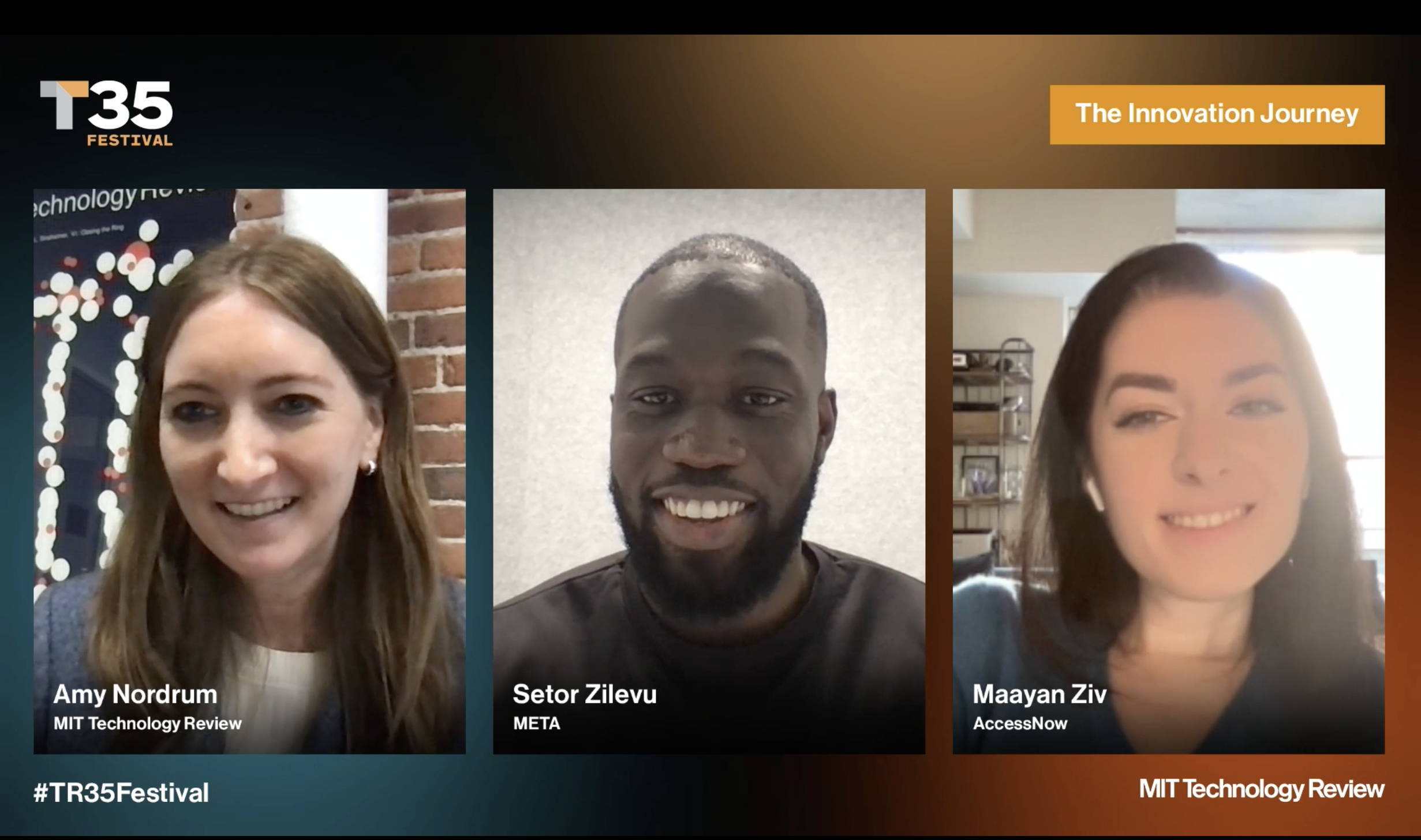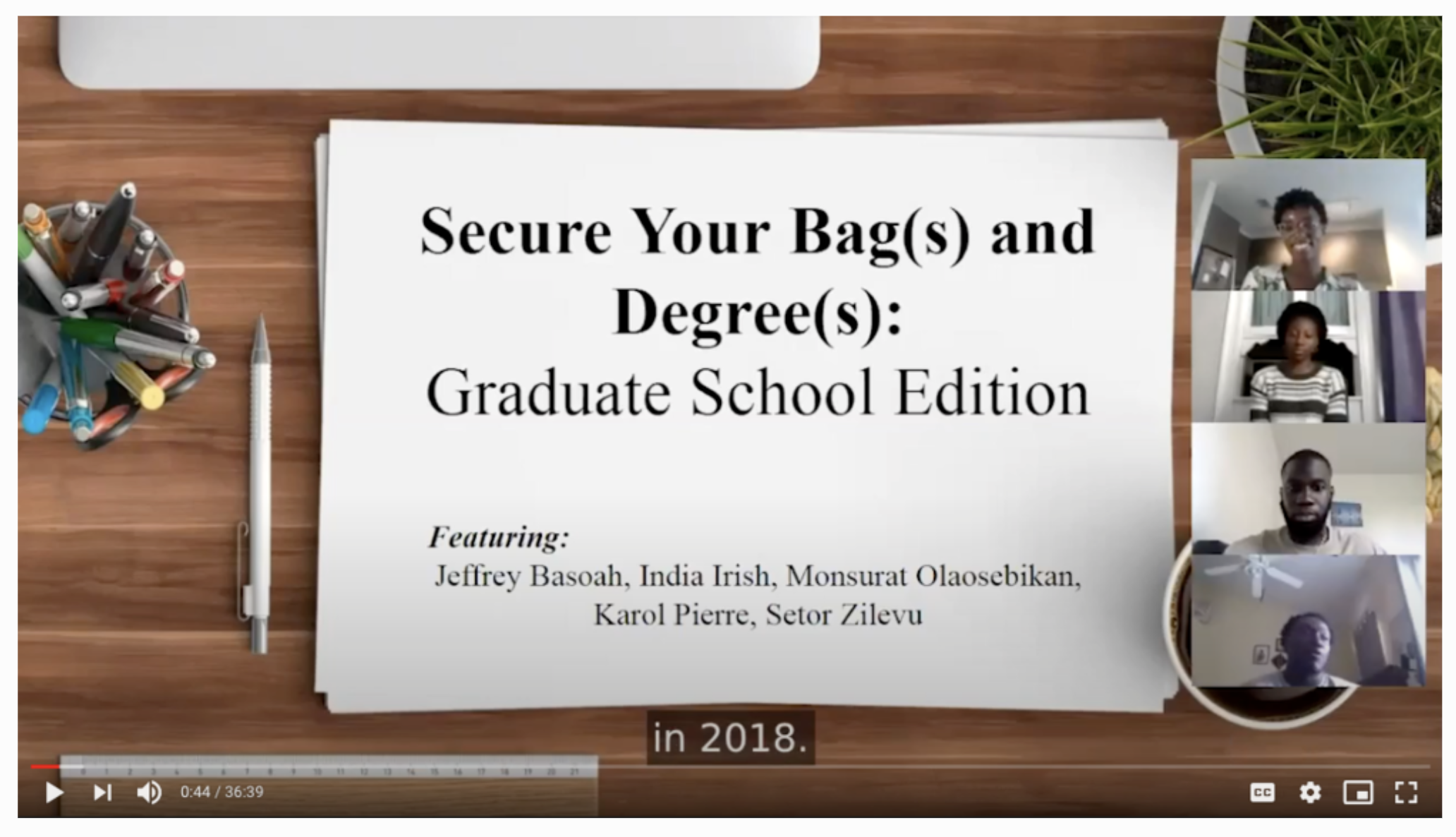Expert Guest Interview
PBS NOVA Engineering Series: Building Stuff - Change it!
Launched in NOVA’s 50th anniversary year and premiering on the heels of the “Building Stuff with NOVA”.
“Building Stuff” is a three-part documentary series that follows engineering experts as they build stuff that helps humanity to amplify our natural abilities, explore uncharted reaches of Earth and space, and preserve our planet’s environment. The series invites audiences to experience the ups and downs with engineers as they design, build, and test their way through various challenges.
Panel Speaker - London, UK
Demystifying AI
Key insights shared:
AI’s power lies in augmenting human creativity and connection, not replacing it.
Biases in AI systems must be tackled to ensure equitable and effective solutions.
Businesses should avoid over-relying on AI and instead focus on solving real-world problems.
The intersection of AI and human intention will shape the future of innovation and accessibility.
Keynote Speaker - Stockholm, Sweden
Designing Artificial Intelligence with Humanity in Mind
In this talk, I explored how human-centric methodologies were integrated into AI development to better understand and predict human behavior, leading to more intuitive and effective AI interactions.
I emphasized the critical role of transparency and education in building trust in AI systems. By providing users with clear insights into how AI systems operated, made decisions, and used data, we empowered them to engage more confidently and responsibly with these technologies.
The talk also addressed the importance of designing AI systems to be scalable and adaptable—capable of evolving alongside technological advancements and shifting societal expectations.
Lastly, I advocated for deeper collaboration across disciplines, bringing together UX designers, AI researchers, engineers, product managers, and end-users. I argued that true innovation in AI emerged from diverse perspectives and that interdisciplinary input was key to building AI that truly served humanity.
Keynote Speaker - Dubai, UAE
Technology Paradox Unveiled: How UX and AI Will Reshape our Future
This talk delves into the intriguing parallels between the Ship of Theseus paradox and the dynamic evolution of UX through AI integration. The Ship of Theseus challenges us to consider whether something retains its identity when every part is replaced over time. In the realm of UX, we’re confronted with a similar question: as AI continuously optimizes, refines, and personalizes digital experiences, at what point does the original design, intention, or identity of the experience dissolve, if ever? Does the integration of AI enhance the experience without compromising its core, or does the gradual replacement of human-centered decisions with AI algorithms ultimately shift the experience into something entirely different? This exploration raises profound questions about the future of digital interaction, design authenticity, and how much change is too much before an experience becomes unrecognizable from its original state.
Design Matter Keynote Speaker - Copenhagen, Denmark
Human Intelligence Reimagined: The Next Frontier in Societal Technology
This talk explored how AI and UX can work together to enhance user experience in the education, retail, and healthcare industries. Discover how the innovative Z Methodology can seamlessly integrate human and computational intelligence to reveal and augment tacit human knowledge and behavior. Education, retail, and healthcare are three significant global areas that could greatly benefit from the merger of user experience research/design and artificial intelligence. The ongoing COVID-19 pandemic has brought these issues even more to the forefront as recurring lockdowns have forced people to stay at home, necessitating the transfer of services to virtual domains.
This talk discussed the application of human-computer interaction (HCI) for complex machine learning in embodied learning scenarios. The work described in this talk applied a novel HCI methodology developed by Dr. Setor Zilevu to complex ML contexts to capture and assess how humans move, think, and learn in embodied spaces. Come join us in this exciting journey of understanding AI's potential in the UX field.
UXCON Keynote Speaker - Vienna, Austria
UX Meets AI
In this talk, Dr. Setor Zilevu shared his expertise in the field of Human-Computer Interaction (HCI) and Artificial Intelligence (AI) as he delves into the Z-Methodology, a framework for understanding the mental models of humans in the context of AI systems. Attendees will gain a deeper understanding of the key challenges in creating human-centric models and working with AI and practical strategies for overcoming these challenges.
DDX Conference Keynote Speaker - Munich, Germany
The Human Side of AI: How to Research, Design, and Build AI Systems
Dr.Zilevu’s innovative “Z method” combines UX and AI together to create better assistive technologies for humans. He has reinvented stroke rehabilitation by enabling patients to receive high-quality feedback and therapy in the comfort of their own homes.
He is the founder of Choix Labs, lead researcher at Meta, and adjunct professor at NYU Tandon School of Engineering. Dr. Zilevu has a wealth of experience working for top tech companies like Adobe, Intel Corporation, and Google. Dr. Zilevu is a thought leader in his field and has a deep passion for understanding how to merge UX and AI together to enhance human experiences with technology.
A Rise to Action
Pioneers in this segment are forging solutions that counter disparities of opportunity and communication to foster a more just, equitable, and intelligent society. See how Innovators are enabling access at the edges to serve marginalized communities to meaningfully participate in the global, digital economy.
Elevating the human voice at the intersection of UX and UXR
An original aspiration to become a neurosurgeon, spurred on by a dare, a couple of scholarships and an internship later, a deeply personal experience led to building out a thesis on humans and machines coming together to empower stroke patients with a vision to apply this methodology to the field of social justice, education, and fashion.
Whether you are a part of a team designing an internal process, application, or product, achieving informed human-centric solutions is key to successful problem-solving. Walk through two perspectives on building a participatory design approach from prototype to testing and roll-out.
MIT TECHNOLOGY REVIEW: 35 INNOVATORS UNDER 35 - GLOBAL LIST
Setor Zilevu, 27, is working at the intersection of human-computer interaction and machine learning to create semi-automated, in-home therapy for stroke patients. After his father suffered a stroke, Zilevu wanted to understand how to integrate those two fields in a way that would enable patients at home to get the same type of therapy, including high-quality feedback, that they might get in a hospital. The semi-automated human-computer interaction, which Zilevu calls the “tacit computable empower” method, can be applied to other domains both within and outside health care, he says.
This innovation will start the process of creating global and inclusive health by bringing UX and Machine Learning into the realm of healthcare to provide high-yielding outcomes for stroke survivors. I have created a process that embeds human intelligence throughout complex A.I. computing. This will ultimately allow therapists to make quick and more informed decisions about patient assessment and provide patients with more granular, detailed feedback about their performance.
BLACKSBURG, Va. (WDBJ) - A recent Virginia Tech grad has become the youngest Ghanaian to receive a user experience (UX) Ph.D
Dr. Setor Zilevu becomes the world’s youngest Ghanaian to receive a User Experience Ph.D.
He received his Ph.D. from Virginia Tech in February. At 26, Dr. Zilevu became the youngest Ghanian User Experience Ph.D., replacing the previous world record owner who was 27, Dr. Gloria Opoku-Boateng Osardu.
His educational journey was inspired by seeing his dad survive a stroke. Dr. Zilevu has been able to explore his passion for user experience (UX) research during his time at Virginia Tech, including an opportunity to design user-friendly interfaces for stroke survivors completing in-home therapy.
He says this achievement is unexpected, but he’s always been encouraged by his family to go as far as he can in education. He has a long list of achievements including receiving Virginia Tech’s William Preston Outstanding Thesis of the Year award in 2019. During his time as a student, Dr. Zilevu worked with companies like Google, Adobe, Intel, and more.
Now, he is a User Experience Researcher at Meta (Facebook).
2022 Virginia Tech’s Computer Science Ph.D. Researcher of the Year
2022 Ph.D. Research Award winner Setor Zilevu is honored at the department's annual award banquet by Cliff Shaffer, director of graduate programs. Zilevu's dissertation titled ‘HCI for Complex Machine Learning’ is centered around creating a human-centric supervisor for Machine Learning systems. The goal of his methodology is to empower humans and increase computational human intelligence. His dissertation will be made public in February 2023.
DR. RICHARD E. NANCE GRADUATE FELLOWSHIP RECIPIENT
Kobla Setor Zilevu is the first recipient of the Dr. Richard E. Nance Graduate Fellowship in Computer Science, funded by computer science alumnus Greg Lavender.
Kobla Setor Zilevu, the first recipient of the Dr. Richard E. Nance Graduate Fellowship in Computer Science, has been able to explore his passion for user experience (UX) research during his time at Virginia Tech, including an opportunity to design user-friendly interfaces for stroke survivors completing in-home therapy.
Zilevu decided on Virginia Tech, with a determined focus to combine his passions for UX, health care, and stroke rehabilitation. Near the end of his undergraduate career, Zilevu’s professor Margaret Ellis told him he should meet one of her colleagues, Aisling Kelliher, who has served as co-director of the Interactive Neurorehabilitation Lab at Virginia Tech since 2015. “It was a beautiful process,” said Zilevu, who still has the notebook from their first meeting. While pursuing his master's of computer science, Zilevu joined Kelliher’s team as a UX researcher.
“Working with different stakeholders, whether that be the patient, therapist, or even our own internal stakeholders, is truly exciting and rewarding to me,” said Zilevu. “I love understanding why people do what they do, especially within the realm of stroke and implementing how we can make it better.”
The fellowship has enabled Zilevu to travel and work with colleagues at the Shirley Ryan AbilityLab in Chicago to advance his research at Virginia Tech. Zilevu said his heart dropped when he first visited the lab in Chicago, realizing it is the No. 1 ranked rehabilitation hospital in America. Zilevu was able to see the real-world application of the program he and his teammates developed at Virginia Tech to be used by real-world stroke survivors. "It was rewarding to see the work that we do is valued," he said.
OUTSTANDING THESIS OF THE YEAR AWARD IN S.T.E.M.
Zilevu was honored with the William Preston Society Master's Thesis Award in Science, Technology, Engineering, and Mathematics. The award was established in 1999 to recognize graduate students whose thesis presents the best original research with the potential to benefit all people. His thesis, Interactive Interfaces for Capturing and Annotating Videos of Human Movement Performance, was selected by a faculty review committee based on the originality of its research and potential for high impact, as well as the contribution made to the scientific community.
Thank you to everyone at the Interactive Neurorehabilitation Lab for all your support! This award would not have been won without each and every single one of you.
LIVING HIS BEST GRAD LIFE: KOBLA SETOR ZILEVU
As a first-year Ph.D. computer science student, Kobla Setor Zilevu has some guiding words to offer fellow incoming graduate students. "The best piece of advice I can offer entering graduate students is to enjoy the process and love what you are researching."
And the love of his research is evident in the many areas he is exploring, which include healthcare, human-computer interaction, user experience design, and user interface design.
This summer, Zilevu will be interning with Facebook as a user experience researcher and returning to Blacksburg in the fall to continue his Ph.D. research in human-computer interaction. He admits that he is very interested and torn between pursuing an avenue to becoming a professor or working in the industry as a research scientist.
NSF GRANT UNITES DIVERSE VIRGINIA TECH TEAM TO IMPROVE IN-HOME PHYSICAL THERAPY
Scientists at the VTC Smart Rehab Lab are developing breakthrough, affordable technology and methods to connect stroke survivors to physical therapy at home through tele-rehabilitation.
The lab was awarded $1.1 million by the National Science Foundation to continue the development of its Semi-Automated Rehabilitation At Home (SARAH) project. The system will include a fused knowledge base of human and machine learning to assess patient performance during training and daily activities at the home and provide feedback to the patient and summaries of progress to the remote therapist – a major innovation that can be expanded to a range of therapy needs.
TAPIA CONFERENCE: SECURE YOUR BAG(S) AND DEGREE(S): GRADUATE SCHOOL EDITION
During the Fall of 2020, I had the opportunity to co-host a workshop for the tips, tricks, and tools to secure your graduate degree and get paid for it. Learn about the GEM Fellowship, what it entails, and hear from current graduate students on both the MS and Ph.D. route, who have had their graduate education FULLY funded and secured internships at some of the top tech companies along the way including Intel, NerdWallet, Facebook, Amazon, Hulu and more.















